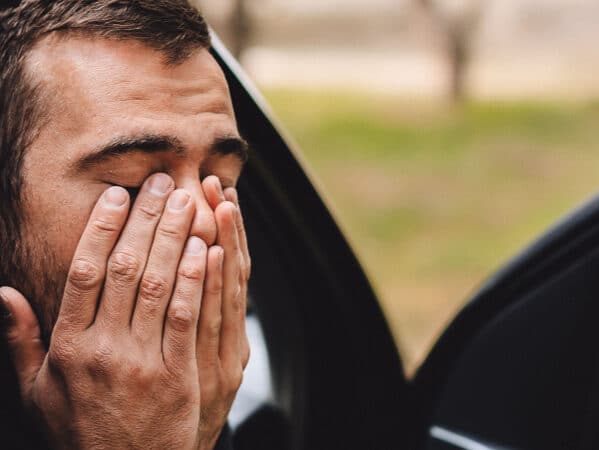Ativan is a benzodiazepine medication often used to treat anxiety and convulsions. It’s safe for short-term use, but taking large doses or abusing the drug for long periods can lead to addiction.
How does an Ativan addiction develop and what are the signs of an addiction? How does it affect your health and your life, and what should you do if you have a lorazepam addiction? You’re not alone and you’ve come to the right place.
What Is Ativan?
Ativan, which is called lorazepam in its generic form, is a benzodiazepine medication that is FDA-approved to treat anxiety. It’s also considered a muscle relaxer. When taken orally, Ativan is digested and enters the bloodstream, where it increases the availability of a certain neurotransmitter, gamma-aminobutyric acid (GABA). GABA is a chemical that plays a role in slowing down the central nervous system or CNS and regulating mood and affect.
A large amount of GABA can create a feeling of heavy relaxation. This slowing can help with anxiety, but it must be taken as directed because making your CNS too slow will also slow down your life-giving functions like breathing.
Doctors should prescribe the drug for short periods to address the symptoms of these conditions. Continued use can lead to significant problems, including addiction.
Why Is Ativan Prescribed?
Ativan is used to treat conditions that result in hyperactivity, anxiety, convulsions, and generally heightened central nervous system activity.
The following conditions may be treated with Ativan:
Some doctors use Ativan in non-FDA-approved ways too, which is called “off-label” use. Lorazepam is often used off-label to treat conditions such as:
Alcohol withdrawal
Insomnia
Panic disorders
Delirium
Chemotherapy nausea
Vertigo
Potential for Abuse: How Addictive Is Ativan?
While it can be effective for the right circumstances, Ativan, like all other benzodiazepines, is a very addictive drug. Each dose causes chemical changes deep within the brain that can lead to an addiction in time.
Ativan consumption triggers the release of endorphins, which can mute or stifle perceptions of pain and enhance the feeling of well-being. When the dosage wears off, you may want to reproduce those good feelings.
Over time, the brain adjusts. Neurotransmitter and endorphin production in the brain is altered to account for the drug’s presence. More Ativan is required to produce euphoria. Altered neurochemical production is also insufficient to regulate your mood without Ativan.
Eventually, you may need Ativan to feel normal. Many individuals who become addicted to prescription drugs like Ativan eventually turn to stronger, often illicit, and potentially dangerous drugs like heroin.
Signs and Symptoms of Ativan Addiction: What to Look Out For
People with an Ativan addiction may display physical, mental, or behavioral symptoms. Spotting the signs of Ativan abuse can mean offering your help and support before the drug abuse worsens.
Physical Signs of Addiction
Because Ativan is a central nervous system depressant, people who abuse the drug may seem drowsy, stiff, or unresponsive. If they try to stop taking the drug abruptly, they may develop seizures.
Mental Signs of Addiction
People who abuse Ativan may seem confused or irritable. They may display a loss of interest in things they once enjoyed. And they may have memory gaps or losses, particularly if they regularly binge on the drug.
Behavioral
Neglecting home or work responsibilities is common among people who abuse Ativan. People may also isolate themselves from friends and family. They may ask for money or drugs.
Risk Factors for Ativan Addiction
Addiction can happen to anyone, but there are certain risk factors which can make someone more prone to developing an addiction to lorazepam. These include:
Past experiences with substance abuse
A history of substance use in your family
Taking more Ativan that you’re prescribed or taking it more often than prescribed
Taking Ativan in ways besides its traditional form, such as crushing and inhaling it nasally to increase its effect or make it take effect faster
Combining lorazepam with other intoxicating substances like alcohol, opioids, or other drugs
Having mental health conditions
None of these guarantee that you’ll develop an addiction to Ativan but they do raise your risk so it’s important to discuss these with your prescribing doctor.
The Dangers of Mixing Ativan with Alcohol
Like Ativan, alcohol is a depressant so it reduces activity of the central nervous system. When consumed in liquid form, alcohol is not digested and instead delivered throughout all parts of the body. Until the liver has broken down the effects of alcohol, it continues to circulate in the bloodstream, affecting the body’s organs.
When alcohol enters the brain, the feeling of drunkenness occurs, as alcohol depresses activity and slows down major central nervous and circulatory system functions like cognition, heart rate, and respiration.
What Can Happen If You Mix Ativan and Alcohol?
Alcohol and Ativan work in similar ways, serving to reduce central nervous system activity. When combined, the two substances can lead to extreme sedation.
In combination, the effects of each drug are magnified, which can lead to dangerously low central nervous system functioning. This can lower heart rate and respiration to dangerous levels, induce a coma, and even cause death.
The combination of alcohol and Ativan is significantly more likely to induce an overdose than consuming either substance alone.


Ativan Withdrawal Symptoms
Ativan and Mental Health Issues
While Ativan is used to treat certain mental health conditions like anxiety and anxious insomnia, it can be problematic if it’s used when you have other mental health conditions, particularly depression. Ativan worsens the effects of depression symptoms, especially in cases of depression that aren’t being successfully managed.
Since Ativan is a central nervous system depressant, it tends to build up in the body’s system over time. If Ativan is taken for prolonged periods of time and/or in higher doses, depression symptoms can often worsen, even resulting in suicidal ideation.
Ativan-related depression is more likely to occur in individuals who use the drug recreationally and those who abuse the drug. Those who use the drug as medically prescribed are less likely to experience depression.
Using Ativan with other substances, especially alcohol, can also worsen depression. Healthcare professionals agree that alcohol use should be avoided when taking Ativan, whether or not you have depression.
The Risks of Quitting Ativan Cold Turkey
Once you are dependent on Ativan, quitting suddenly can be extremely distressing and even life-threatening. It is never recommended to quit Ativan or other benzodiazepines cold turkey. Quitting cold turkey shocks the brain and the body, especially in cases where tolerance has been built up.
Ativan Withdrawal Symptoms
If you try to quit Ativan cold turkey, you’re at a higher risk for severe withdrawals and dangerous complications. Common symptoms of Ativan withdrawal may include:
Sweating
Fever
Rapid breathing
Rapid pulse
Tremors and shakes
Insomnia
Nausea and vomiting
Hallucinations, delirium and psychosis
Rapid, purposeless movements like pacing or fidgeting
Anxiety and panic attacks
Depression
Irritability
Memory and concentration problems
Neck and head pain or stiffness
Tingling and numbness
Seizures
Hallucinations, also known as withdrawal delirium, are not necessarily life-threatening but they can be extremely distressing and can also lead to accidents or injuries without professional oversight or support. Also, it’s estimated that about 20-30% of people experiencing sedative withdrawal (which includes Ativan) experience a seizure, emphasizing the need for medical detox and treatment.
Some of the withdrawal symptoms can become medically serious and, in some cases, even life-threatening. This is why you need medical supervision, with professionals who can ease your withdrawal symptoms and monitor your health along the way to catch and treat any complications that arise.
How to Quit Ativan Safely
If you shouldn’t quit Ativan cold turkey, what’s the right way to quit? The safest way to stop using Ativan is to go through a medical detox program, which most often entails tapering off the drug. Recommended detox settings for Ativan withdrawal include:
Acute care hospital
Psychiatric hospital
Freestanding medical detox program
Inpatient detox within an addiction treatment program
Tapering off Ativan is conducted by lowering the dose over a certain period of time, usually around eight weeks, until the dosage amount is lowered to zero. This slow approach to withdrawal reduces the likelihood of severe withdrawal symptoms and cravings, keeping patients safe throughout the process.
If any symptoms do occur, they can be managed by a medical professional, or the tapering dosage can be adjusted.
Treatment for Ativan Addiction
If you believe you have an Ativan addiction, what can you expect from treatment? Everyone’s recovery journey will be unique to them and their specific needs, but there are certain stages and types of Ativan treatment you can expect.
Supervised Taper
Medical supervision is needed for safe benzodiazepine withdrawal. A doctor will design and oversee a tapering schedule, so your dosage of Ativan will be gradually reduced over time. If you quit Ativan cold turkey instead of tapering, you can develop serious health problems. Some, including seizures, can be life-threatening.
Medical Detox
While a supervised taper is helpful for some people, others need more supervision to quit using the drug. A benzo detox program can help.
Medical detox usually involves the tapering schedule described above but with more actie medical supervision. You may be prescribed certain medications to address specific symptoms of withdrawal or any co-occurring mental health issues, such as antidepressants or anti-anxiety medications.
Rehabilitation
Following medically managed detox, a comprehensive addiction treatment plan is optimal. In therapy, you’ll address the reasons that led to your Ativan abuse, and you’ll begin to build a healthier life in recovery.
Depending on the intensity of your addiction, inpatient or outpatient treatment may be appropriate.
Inpatient care requires that you live in a treatment facility, often for a few months, where you will receive medical attention and support around the clock.
Outpatient rehabilitation involves a continuation of care within your home environment. It also typically consists of individual and group counseling sessions to provide psychological and social support.
What to Expect in Therapy for Ativan Addiction
Counseling with therapy is an evidence-based approach for Ativan addiction treatment. Whether you are in treatment at an inpatient rehab or in an outpatient program, therapy will be your primary treatment. There are numerous therapy approaches and techniques you may receive, such as:
| Cognitive behavioral therapy (CBT) | You work with a therapist to understand the connection between your thoughts, feelings, and behaviors to avoid relapse and learn coping skills. |
| Dialectical behavior therapy (DBT) | This type of CBT involves talk therapy and an education aspect to improve emotional regulation, distress tolerance, mindfulness, and interpersonal effectiveness. |
| Motivational enhancement therapy | This type of therapy focuses on resolving your ambivalence about entering treatment and stopping substance abuse. |
| Contingency management | You receive tangible rewards like vouchers or cash for abstinent behaviors, such as drug-free urine tests. |
| Group therapy | Facilitated by a mental health professional, you meet with other patients to discuss issues related to Ativan addiction, challenges, and successes. You may practice sober social skills, drug refusal strategies, and role-play. |
| Family therapy | Led by a mental health professional, you and at least one family member meet to heal the damage caused by Ativan abuse, improve family bonds, and learn conflict resolution and communication skills. |
| Eye movement desensitization and reprocessing (EMDR) | A therapist works with you to reduce the distress related to traumatic memories, using focused eye movements. |
| Holistic and complementary therapies | Combined with evidence-based therapies, holistic therapies like creative arts therapy and yoga may help treat various aspects of addiction. |
Long-Term Recovery From Ativan Addiction
Research proves that people can and do overcome drug problems. In fact, in one study, more than 80% of people who finish treatment make improvements in areas like self-improvement, family engagement, civic duty, and economic participation. Aftercare planning makes this lifelong recovery possible.
After you complete structured addiction treatment, there are many services and techniques that can help you sustain your sobriety and cope with new issues and temptations when they arise. These can include:
12-step meetings, such as Narcotics Anonymous (NA)
Non-12-step meetings, such as SMART Recovery
Group counseling
Individual therapy
Drug education classes
Vocational classes
Sober living homes
Freeing Yourself from Ativan Addiction
So many people start using Ativan with genuine intentions to ease their mental health challenges but eventually find themselves with an addiction. While a lorazepam addiction can be a powerful problem in your life, it can be treated and there’s plenty of reason to hope for the future, especially when you have Boca Recovery Center in your corner. Contact Boca Recovery Center to learn more about our luxury rehab and flexible treatment programs.
Frequently Asked Questions About Ativan Addiction & Abuse
We’ve compiled some of the most frequently asked questions about Ativan addiction and abuse.
Anxiety disorders and epilepsy are the two conditions often treated with Ativan. Some doctors use the medication to treat other conditions, such as alcohol withdrawal.
Ativan stays in your system for several days, long after you no longer feel its effects.
Ask your doctor. There’s some evidence that Ativan can cause problems like preterm labor and low birth weight.
Yes. Depression can be an Ativan side effect.
No. You should never quit Ativan cold turkey, as it can lead to seizures.
- Ativan. U.S. Food and Drug Administration. Published February 2021. Accessed June 29, 2023.
- Maust DT, Lin LA, Blow FC. Benzodiazepine Use and Misuse Among Adults in the United States. Psychiatr Serv. 2019;70(2):97-106.
- Brett J, Murnion B. Management of benzodiazepine misuse and dependence. Aust Prescr. 2015;38(5):152-155.
- Lorazepam. ClinCalc. Accessed June 29, 2023.
- Lorazepam. StatPearls. Published January 21, 2023. Accessed June 29, 2023.
- Longo L, Johnson B. Addiction: Part 1. Benzodiazepines—Side effects, abuse risk, and alternatives. Am Fam Physician. 2000;61(7):2121-2128












